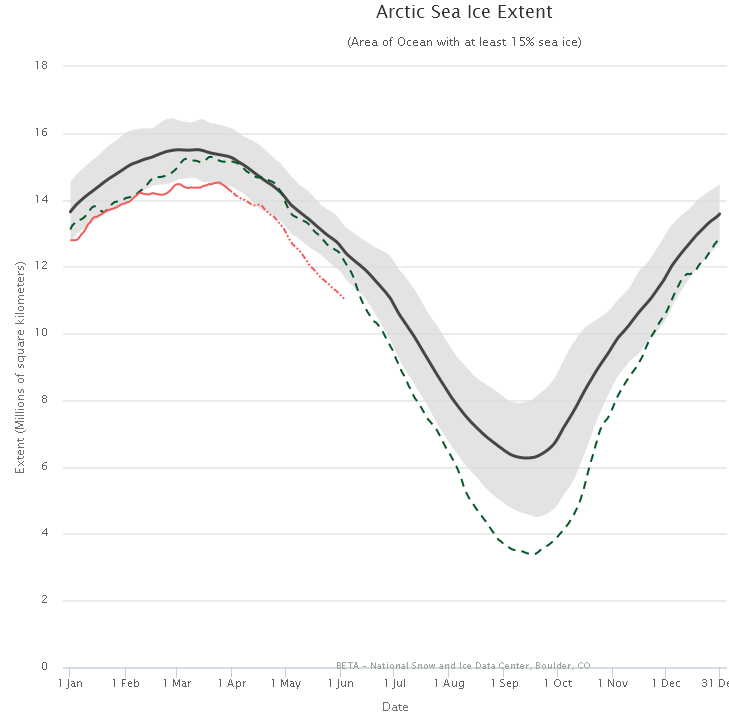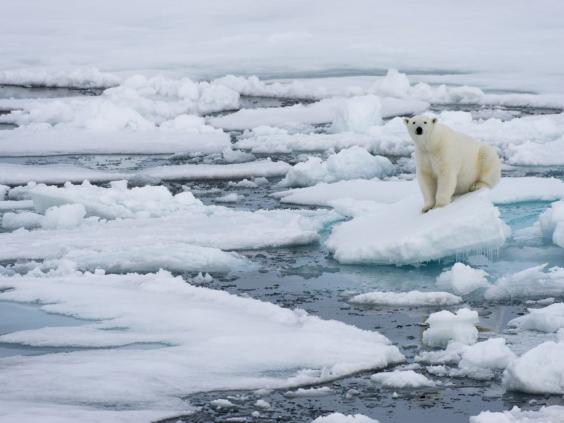The Arctic may lose its ice soon - for the first time in 100,000 years
Cambridge Professor Peter Wadems [Peter Wadhams] argues that as early as this or the next year the Arctic can be completely free of ice, which has not happened in the past 100 thousand years. According to preliminary data obtained from the meteorological satellite, only 11.1 million square kilometers were observed in the Arctic on June 1. sea ice, which is the minimum value for this time of year.
Professor Peter Wadems is the head of the Polar Oceans Research Group at the University of Cambridge. He uses data received from the DMSP F-18 satellite and provided by the US Snow and Ice Research Center. The center is engaged in research of the Earth's cryosphere - snow, ice, glaciers and other natural phenomena that appear at low temperatures.
')
The ice area recorded in June is 1.5 million square kilometers less than the average. - This is about a third of the area of the entire European Union. Wedams claims that what is happening confirms his predictions made four years ago.

The solid black line is the average ice area over the past 30 years; gray area — standard deviation; intermittent green - data for 2012; red - current year (dotted data - preliminary).
“My prediction remains unchanged: the Arctic ice may disappear - more specifically, its area may become less than a million square kilometers - by September of this year. Even if the ice does not disappear completely, its area will be record low. Definitely it will be less than the current record of 3.4 million square kilometers. There is a pretty good chance that we will see an area of less than a million - if not this year, then next. ”
The disappearance of ice suggests that the central part of the Arctic and the North Pole will be free of ice. Most of the ice that remains inside the Arctic Circle will be concentrated on islands in northern Canada. The last time such a picture on our planet, according to scientists, could be observed from 100 to 120 thousand years ago.
Also, the Arctic Ocean in the north of Russia is already practically free of ice, and the coastal seas have become much warmer than usual. Apparently, this route will soon become navigable year-round, which will open up new opportunities for maritime transport.

Scientists also note that methane accumulated on the seabed enters the atmosphere at an alarming rate, and in just five years is able to raise the average temperature by 0.6 ° C. Peter Wadams calls this perspective a “jump in global warming” and regards it as “threatening.”
In addition to the release of methane, reducing the area of ice will contribute to the acceleration of global warming in another way - the surface of the planet becomes darker, which means it reflects less sunlight.
Professor [Jennifer Francis] is skeptical about the statements about the very early demise of Arctic ice, and believes that this could happen around 2030-2050. But she also agrees that something “very unusual” is happening in the Arctic, and that in September we will indeed be able to observe a new record for the minimum area of ice.
One of the leading climate experts, Dr. Peter Gleick, has so far been unable to either confirm or deny Wadems’s allegations. He notes that in case of erroneous predictions, public opinion will cause unnecessary skepticism regarding climatologists.
However, he confirms that the rise in temperature has reached an alarming scale, and a decrease in the amount of ice in the Arctic will lead to serious negative changes in the ecosystem and weather. “We are on a train that has gotten out of control, and although scientists are sounding the alarm, politicians continue to throw coal into the furnace,” says Glake.
Source: https://habr.com/ru/post/394949/
All Articles